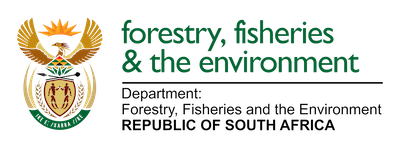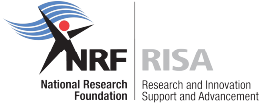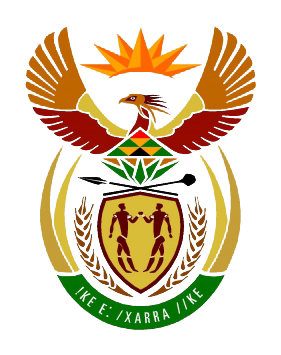
by Ria Olivier | Apr 21, 2020 | Announcement, Fellowship, Jobs, Research, SA Agulhas II, SANAP, Southern Ocean
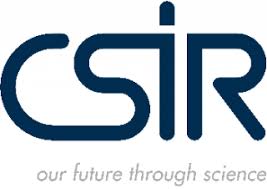
 CAREER OPPORTUNITY – Post Doctoral Fellowships. The Council for Scientific and Industrial Research (CSIR) is a leading scientific and technology research organisation that researches, develops, localises and diffuses technologies to accelerate socio-economic prosperity in South Africa. The organisation’s work contributes to industrial development and supports a capable state.
CAREER OPPORTUNITY – Post Doctoral Fellowships. The Council for Scientific and Industrial Research (CSIR) is a leading scientific and technology research organisation that researches, develops, localises and diffuses technologies to accelerate socio-economic prosperity in South Africa. The organisation’s work contributes to industrial development and supports a capable state.


 The CSIR has three opportunities for Post-Doctoral Fellowships in the Southern Ocean Carbon and Climate Observatory programme (SOCCO), within the Smart Places cluster, and hosted at the Marine Institute (Ma-Re), UCT. The purpose of the fellowships is to conduct research in line with three H2020 projects in which SOCCO is a partner. The positions are offered as a two-year contract with the possibility of extension for a third year. These opportunities are based in Rosebank, Cape Town. For more information about the programme and cluster please visit http://www.socco.org.za and http://www.csir.co.za/smart-places respectively.
The CSIR has three opportunities for Post-Doctoral Fellowships in the Southern Ocean Carbon and Climate Observatory programme (SOCCO), within the Smart Places cluster, and hosted at the Marine Institute (Ma-Re), UCT. The purpose of the fellowships is to conduct research in line with three H2020 projects in which SOCCO is a partner. The positions are offered as a two-year contract with the possibility of extension for a third year. These opportunities are based in Rosebank, Cape Town. For more information about the programme and cluster please visit http://www.socco.org.za and http://www.csir.co.za/smart-places respectively.



- Southern Ocean CO2 and heat uptake: the future role of the Southern Ocean ininfluencing the rates of global warming depends critically on the sensitivity of its uptake and storage of heat and anthropogenic CO This sensitivity is thought to be largely dependent on the response in the physics of the mixed layer and sea ice system to climate change. This fellowship aims to use air-sea CO2 reconstructions, high resolution models as well as Earth System Models (ESM) to examine the climate sensitivity of the mechanisms that explain CO2 and heat ocean-atmosphere fluxes in the Southern Ocean.
- Southern Ocean emerging feedbacks in carbon cycle: the sensitivity of coupled ocean- atmosphere physical and ocean biogeochemical mechanisms to climate forcing can lead to regional non-linear responses that lead to changing feedbacks, thresholds of abrupt change and tipping pointes. This fellowship aims to use the South African ESM combination with other CMIP6 models to examine how non-linearities in the carbon cycle can be linked to specific physical and biogeochemical mechanisms, their scales and dynamics in the Southern
- Southern Ocean Biogeochemical model development: the sensitivity of the ocean biological carbon pump to climate forcing is critical to project changing carbon feedbacks in the second half of the 21st century, particularly in the Southern Ocean. For this fellowship the successful candidate will be a biogeochemical modeller, who will be responsible for model development through improved parameterisations of physiological processes for phytoplankton in coupled biogeochemical-physical models. This will be done based on experience in parameterisations for functional responses to multiple Observational data will be collected under varying conditions that will be used to derive and implement new relationships into numerical models.
Key responsibilities:
- Initiate further independent research within the strategic objectives of the current programme;
- Assist with Master’s and Doctoral supervision of students in support of the SOCCO/UCT- Ma-Re human capital development mission;
- Lead, assist and supervise field data collection and model development;
- Contribute to the writing of numerous reviewed journal publications, and be the lead author of at least
Qualifications, skills and experience:
- A Doctoral degree in Ocean CO2 or biogeochemical modelling and/or observations, withexperience in modelling;
- Experience in acquiring and processing large global data sets as well as running and analysing model outputs;
- Proficiency in Python
Closing date: 15 May 2020
PLEASE NOTE THAT FEEDBACK WILL BE GIVEN TO SHORTLISTED CANDIDATES ONLY.
For more info, please contact the CSIR Recruitment Centre on 012 841 4774 or email us at Recruitmentinfo@csir.co.za
The CSIR is an equal opportunity employer. As such, it is committed to the Employment Equity Act of 1998. By applying for this position at the CSIR, the applicant understands, consents and agrees that the CSIR may solicit a credit and criminal report from a registered credit bureau and/or SAPS (in relation to positions that require trust and honesty and/or entail the handling of cash or finances) and may also verify the applicant’s educational qualifications and employment history. The CSIR reserves the right to remove the advertisement at any time before the stated closing date and it further reserves the right not to appoint if a suitable candidate is not identified.
PLEASE NOTE THAT FEEDBACK WILL BE GIVEN TO SHORTLISTED CANDIDATES ONLY.
For more info, please contact the CSIR Recruitment Centre on 012 841 4774 or email us at Recruitmentinfo@csir.co.za
The CSIR is an equal opportunity employer. As such, it is committed to the Employment Equity Act of 1998. By applying for this position at the CSIR, the applicant understands, consents and agrees that the CSIR may solicit a credit and criminal report from a registered credit bureau and/or SAPS (in relation to positions that require trust and honesty and/or entail the handling of cash or finances) and may also verify the applicant’s educational qualifications and employment history. The CSIR reserves the right to remove the advertisement at any time before the stated closing date and it further reserves the right not to appoint if a suitable candidate is not identified.
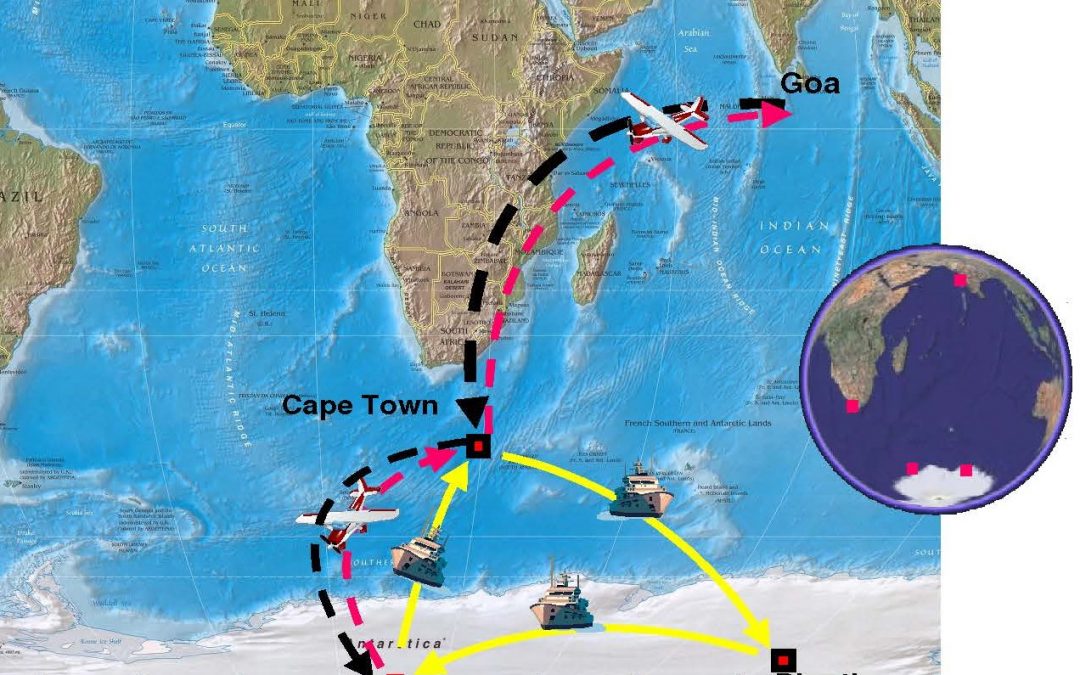
by Ria Olivier | Mar 10, 2020 | Announcement, Antarctica, Current Event, Fellowship, News, Research, SCAR, Science, Stations
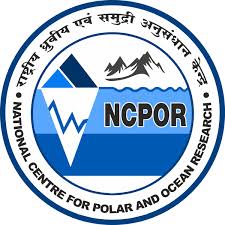 INVITATION FOR INNOVATIVE RESEARCH PROPOSALS
INVITATION FOR INNOVATIVE RESEARCH PROPOSALS
40th INDIAN SCIENTIFIC EXPEDITION TO ANTARCTICA  (40-ISEA)
(40-ISEA)
National Centre for Polar and Ocean Research, an Earth System Science Organization (ESSO-NCPOR & erstwhile NCAOR), under the Ministry of Earth Sciences (MoES), Government of India, is the nodal agency for implementation of the Indian Antarctic Programme. Hitherto, thirty-nine scientific expeditions to Antarctica have been successfully completed. The fortieth Antarctic Expedition, scheduled to be launched in October- November 2020 is being initiated through this advertisement.
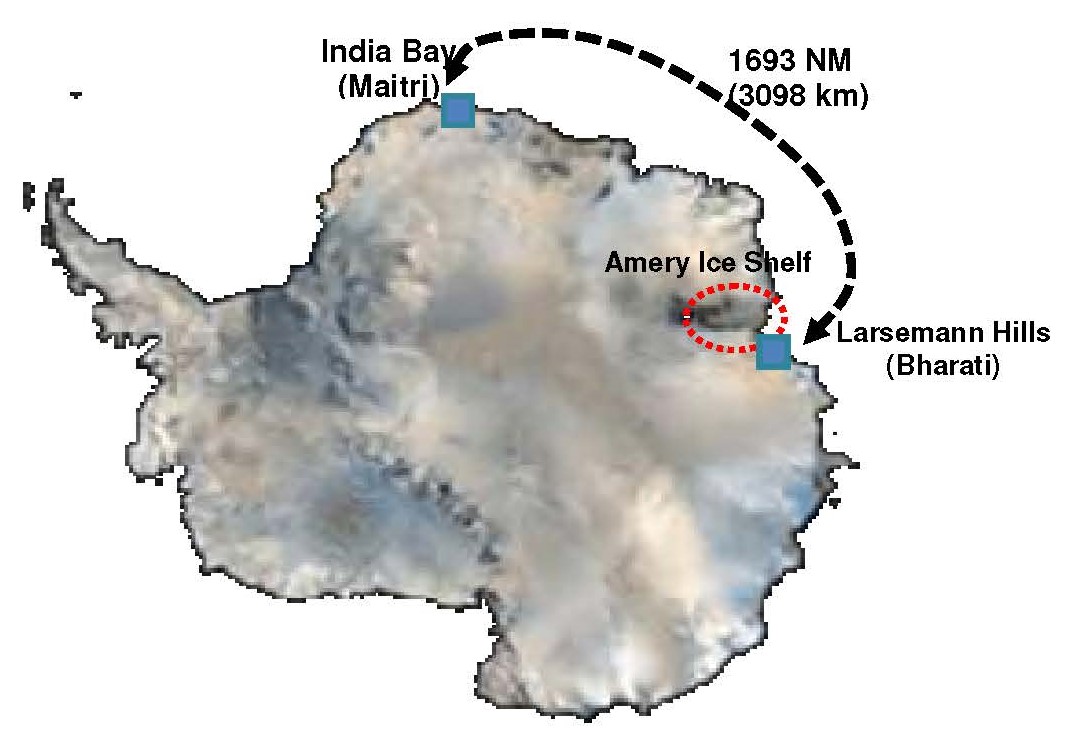 -NCPOR operate two-year round stations in Antarctica, which are~ 3000 km apart
-NCPOR operate two-year round stations in Antarctica, which are~ 3000 km apart
The 40th Indian Scientific Expedition to Antarctica (40-ISEA) embarks on a new journey of scientific research. ESSO-NCPOR welcomes long-term innovative scientific proposals in thematic areas and its sub-themes in different disciplines. In addition to the ongoing programmes
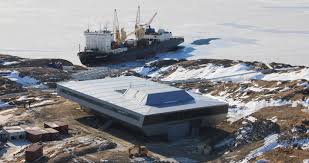
Bharati Station
of different institutions, ESSO-NCPOR welcomes scientific projects under the following broad areas with area of focus being Amery Ice-Shelf in Prydz Bay region for multi-national, multi-institutional programme with special reference to geoscientific program viz identification of orogenic and cratonic components to arrive at a refined India-Antarctica geological correlation.
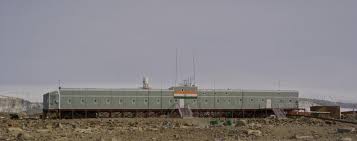
Maitri Station
Travel arrangements for all expedition members 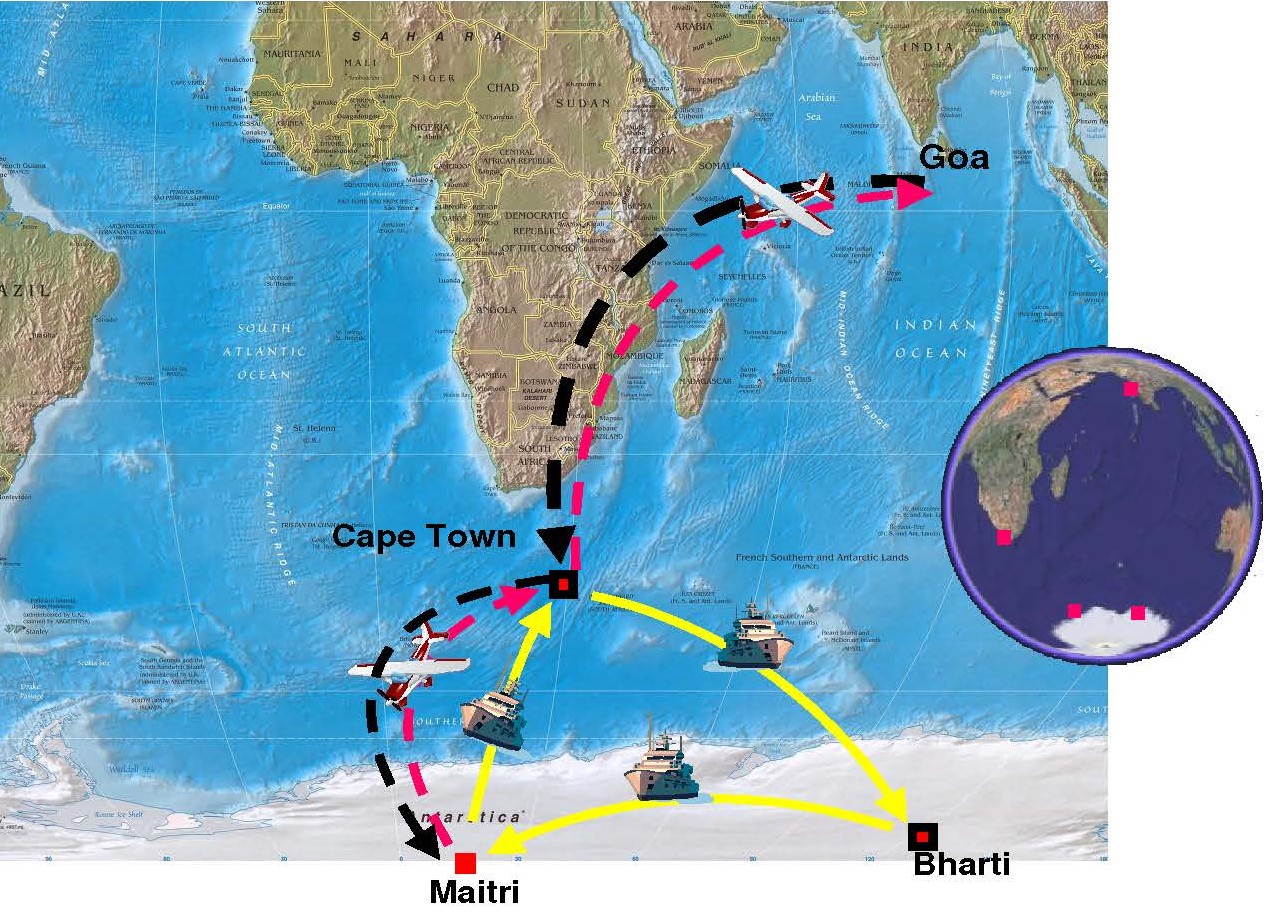 from Goa to Antarctica and back is taken care of by ESSO-NCPOR. Travel only available in Summer Season
from Goa to Antarctica and back is taken care of by ESSO-NCPOR. Travel only available in Summer Season
Read more about the Expedition on the NCPOR website and download the Call for Research Proposal
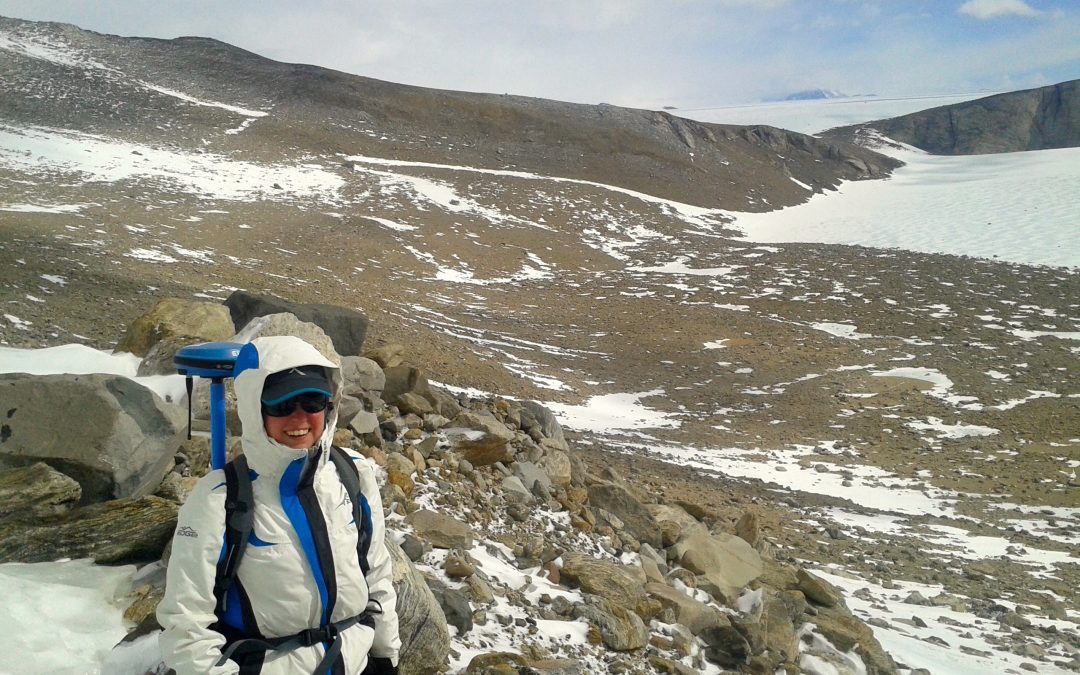
by Ria Olivier | Mar 1, 2020 | Antarctica, Fellowship, Marion Island, Research, SANAP, Science, Southern Ocean, Uncategorised, Women in Science
11 February 2020 was the International Day of Women and Girls in Science and 8 March 2020 is International Womens day. Within the SANAP environment there are many women, this article highlight four early women career scientists.
Liezel Rudolph is chair of the Association of Polar Early Career Scientists (APECS) of South Africa. She is a PhD student, working on cosmogenic nuclide surface exposure dating  of Marion Island in the sub-Antarctic. Her research is on the impact of various physical factors on landscape change, for example: animals (seals in particular) on soil properties and vegetation community composition; ice, above or below the ground surface. Geomorphology or better known as Physical Geography is her area(s) of Interest and more specifically, the processes behind
of Marion Island in the sub-Antarctic. Her research is on the impact of various physical factors on landscape change, for example: animals (seals in particular) on soil properties and vegetation community composition; ice, above or below the ground surface. Geomorphology or better known as Physical Geography is her area(s) of Interest and more specifically, the processes behind 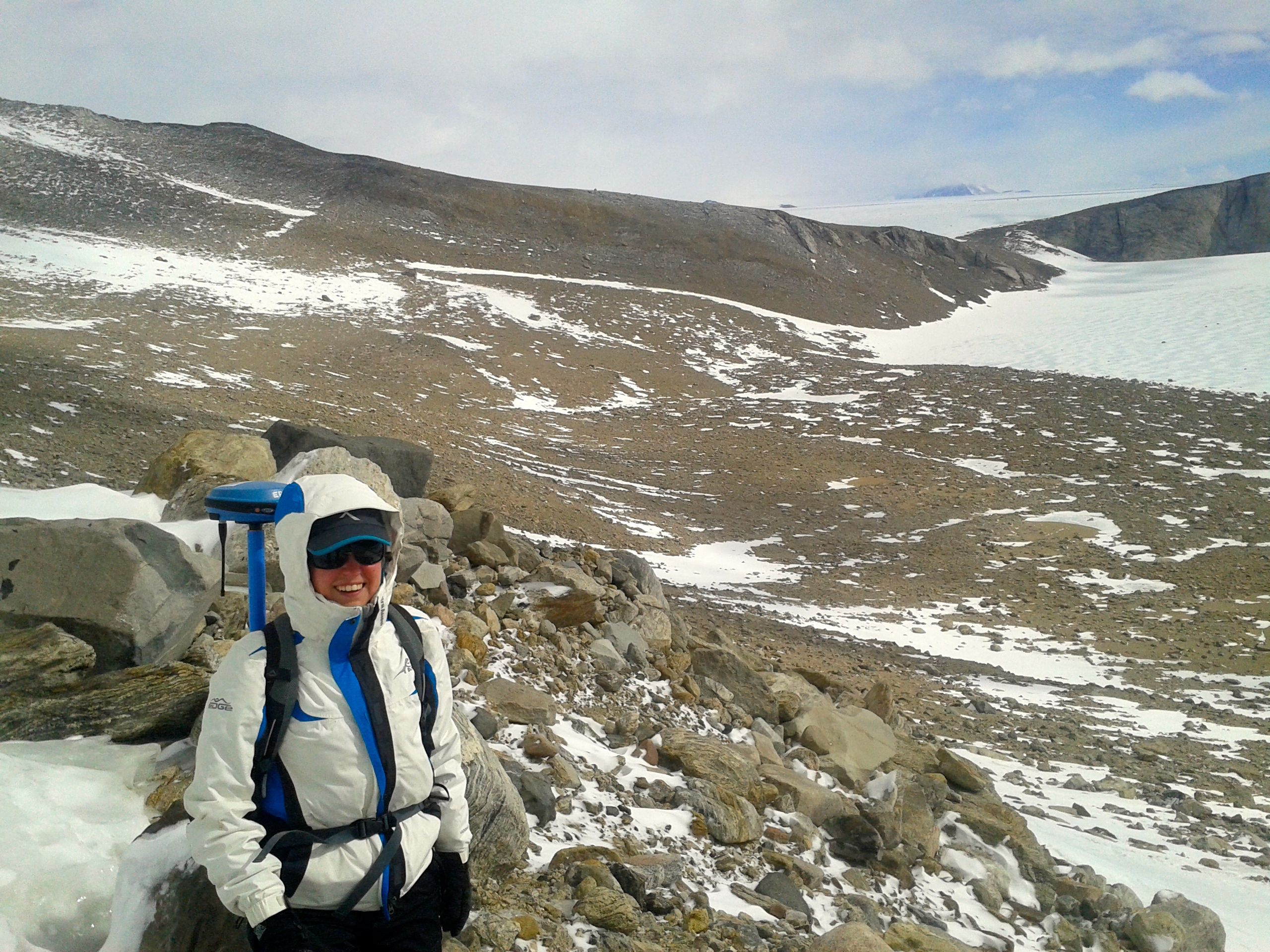 Periglacial Landforms and to a lesser extent Biogeomorphology. She is fascinated by cold and mountainous places, and thus prefer to work in environments like the High Drakensberg, Subantarctic Marion Island or Antarctica. Liezel is a lecturer at the University of the Free State, Bloemfontein and one of the founding members of APECSSA. Since June 2019 she is the APECSSA Chair. Her Master’s work on rock glaciers took her to Antarctica twice (2013/14 & 2014/15), while her Honors studies led to a visit to Marion Island (2011). Her PhD studies have since taken her to Marion Island again (in 2017), most recently in 2019.
Periglacial Landforms and to a lesser extent Biogeomorphology. She is fascinated by cold and mountainous places, and thus prefer to work in environments like the High Drakensberg, Subantarctic Marion Island or Antarctica. Liezel is a lecturer at the University of the Free State, Bloemfontein and one of the founding members of APECSSA. Since June 2019 she is the APECSSA Chair. Her Master’s work on rock glaciers took her to Antarctica twice (2013/14 & 2014/15), while her Honors studies led to a visit to Marion Island (2011). Her PhD studies have since taken her to Marion Island again (in 2017), most recently in 2019.
Kolisa Yola Sinyanya is a PhD. candidate in Oceanography at the University of Cape Town (UCT). Her Ph.D.  research is part of a growing body of work that critically examines biogeochemical cycling in the ocean, particularly regions that are currently under-sampled. The research aims involve exploring phytoplankton community dynamics and microbe-nutrient interactions in the Indian Ocean, including subtropical and Southern
research is part of a growing body of work that critically examines biogeochemical cycling in the ocean, particularly regions that are currently under-sampled. The research aims involve exploring phytoplankton community dynamics and microbe-nutrient interactions in the Indian Ocean, including subtropical and Southern 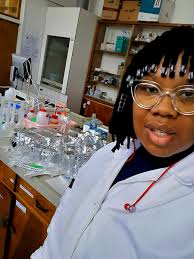 Ocean waters. To-date, Kolisa has been awarded the Advancing Womxn Fellowship in the Department of Oceanography. She is a Black Women in South Africa Fellows of 2019. In 2019 she was nominated as one of the Inspiring Fifty Women in STEM South Africa. Kolisa has a passion for learning science and for sharing her science and this PhD programme has allowed her to engage in effective science communication through both public speaking and scientific writing. Kolisa’s work has also been documented in the academic communication magazine, The Conversation Africa. Earlier this year she was invited to be on the “New Voices” panel at the annual Nature, Environment and Wildlife Filmmakers Congress. Sinyanya is committed to increasing the visibility of women in STEM and to that end, she runs a blog called Women In Science Hub.
Ocean waters. To-date, Kolisa has been awarded the Advancing Womxn Fellowship in the Department of Oceanography. She is a Black Women in South Africa Fellows of 2019. In 2019 she was nominated as one of the Inspiring Fifty Women in STEM South Africa. Kolisa has a passion for learning science and for sharing her science and this PhD programme has allowed her to engage in effective science communication through both public speaking and scientific writing. Kolisa’s work has also been documented in the academic communication magazine, The Conversation Africa. Earlier this year she was invited to be on the “New Voices” panel at the annual Nature, Environment and Wildlife Filmmakers Congress. Sinyanya is committed to increasing the visibility of women in STEM and to that end, she runs a blog called Women In Science Hub.
Daniela Monsanto is a PhD Candidate at University of Johannesburg.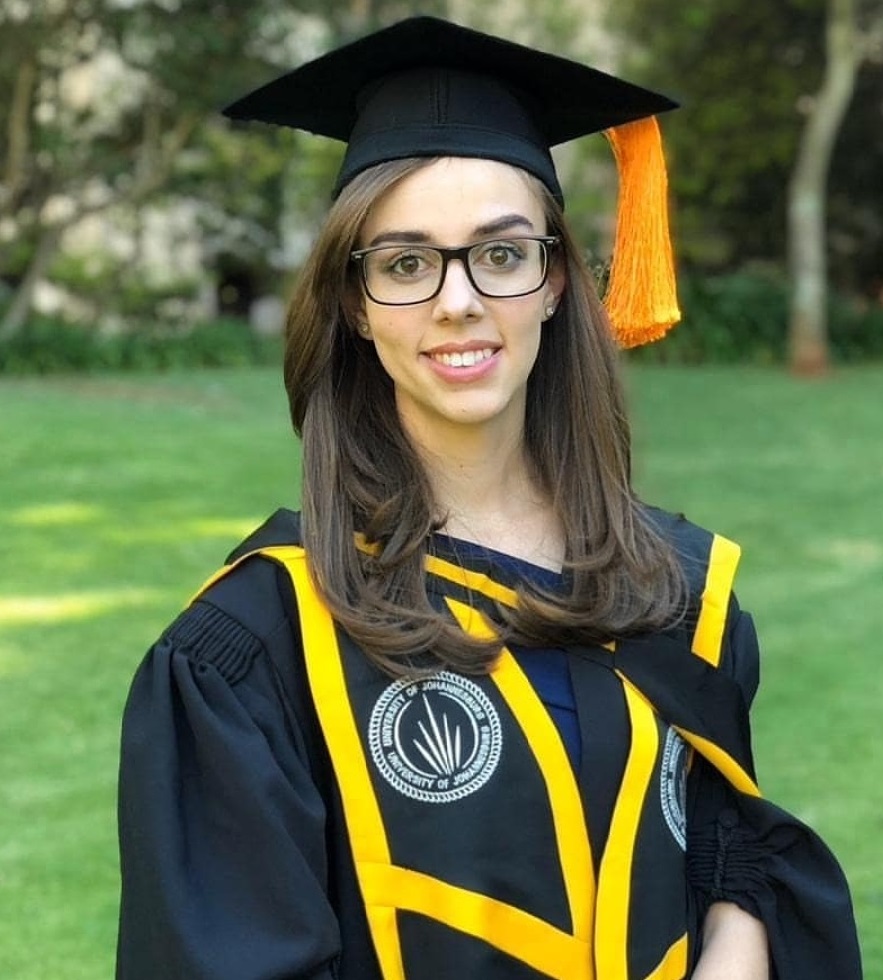 She has just been awarded the HJ Scoonbee medal for the best MSc Dissertation in Zoology(UJ) Her work documented the fine scale genetic patterns in a springtail species on Marion Island. Daniela is using next-generation sequencing technologies to develop a suite of informative markers (including whole gnome assembly) to address ecological and evolutionary questions of the springtail species, Cryptopygus antarcticus travei, on Marion Island. Her work will allow us to identify the forces that impose strong selection
She has just been awarded the HJ Scoonbee medal for the best MSc Dissertation in Zoology(UJ) Her work documented the fine scale genetic patterns in a springtail species on Marion Island. Daniela is using next-generation sequencing technologies to develop a suite of informative markers (including whole gnome assembly) to address ecological and evolutionary questions of the springtail species, Cryptopygus antarcticus travei, on Marion Island. Her work will allow us to identify the forces that impose strong selection 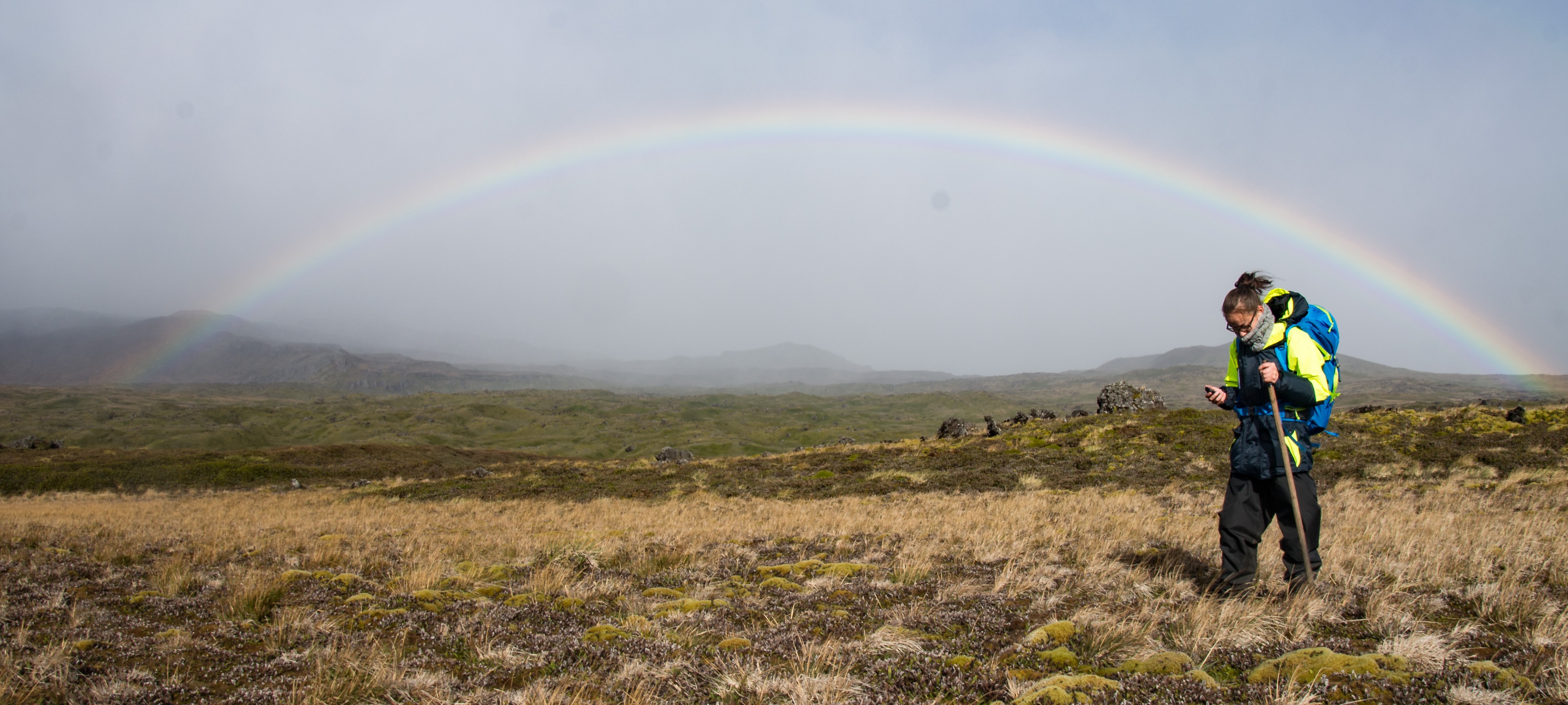 pressures on the organism and the genes that experience selection in response to environmental change. Her results highlighted complex spatial genetic patterns that could be driven by micro-habitat preferences and/or a fitness funnel driven by local adaptations. This complexity illustrates that individuals respond to environmental changes. Her results may bring about far-reaching implications for conservation management on Marion Island, highlighting the importance of considering fine-scale evolutionary processes in management plans. In essence, her results emphasize that conservation efforts are best addressed in a ‘bottom-up’ approach as opposed to a ‘top-down’ approach, which is the case for (Southern Ocean) biodiversity. She is passionate about her work and is extremely fond of the world down south. Daniela loves everything about nature, the outdoors, and sports, particularly soccer, of which she is part of a ladies team in a provincial league. She enjoys spending time with her friends and family, and in her free time, she enjoys the hobby of fishkeeping.
pressures on the organism and the genes that experience selection in response to environmental change. Her results highlighted complex spatial genetic patterns that could be driven by micro-habitat preferences and/or a fitness funnel driven by local adaptations. This complexity illustrates that individuals respond to environmental changes. Her results may bring about far-reaching implications for conservation management on Marion Island, highlighting the importance of considering fine-scale evolutionary processes in management plans. In essence, her results emphasize that conservation efforts are best addressed in a ‘bottom-up’ approach as opposed to a ‘top-down’ approach, which is the case for (Southern Ocean) biodiversity. She is passionate about her work and is extremely fond of the world down south. Daniela loves everything about nature, the outdoors, and sports, particularly soccer, of which she is part of a ladies team in a provincial league. She enjoys spending time with her friends and family, and in her free time, she enjoys the hobby of fishkeeping.
Rudzani Silima is the first Champion for the Antarctic Cities Youth Expedition(ACYE). 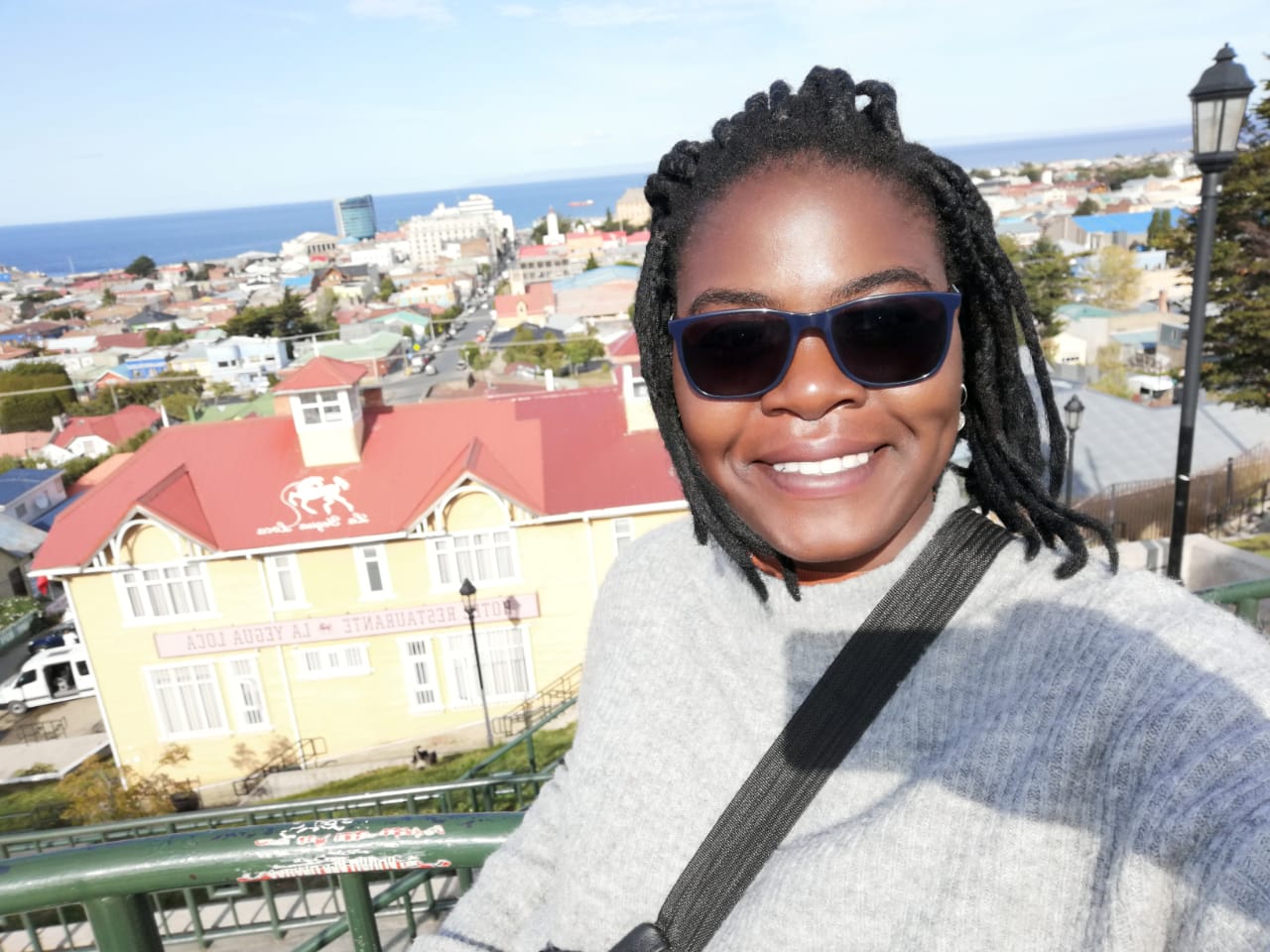 She is currently a Capetonian and studies towards a Masters in Physical/Chemical Oceanography, through the Nelson Mandela University. She was one of 41 students that qualified for this year’s SEAmester cruise and won the prize for best student on-board. During the SEAmester cruise, Rudzani showed her passion for science, nature and especially the Southern Ocean. She has
She is currently a Capetonian and studies towards a Masters in Physical/Chemical Oceanography, through the Nelson Mandela University. She was one of 41 students that qualified for this year’s SEAmester cruise and won the prize for best student on-board. During the SEAmester cruise, Rudzani showed her passion for science, nature and especially the Southern Ocean. She has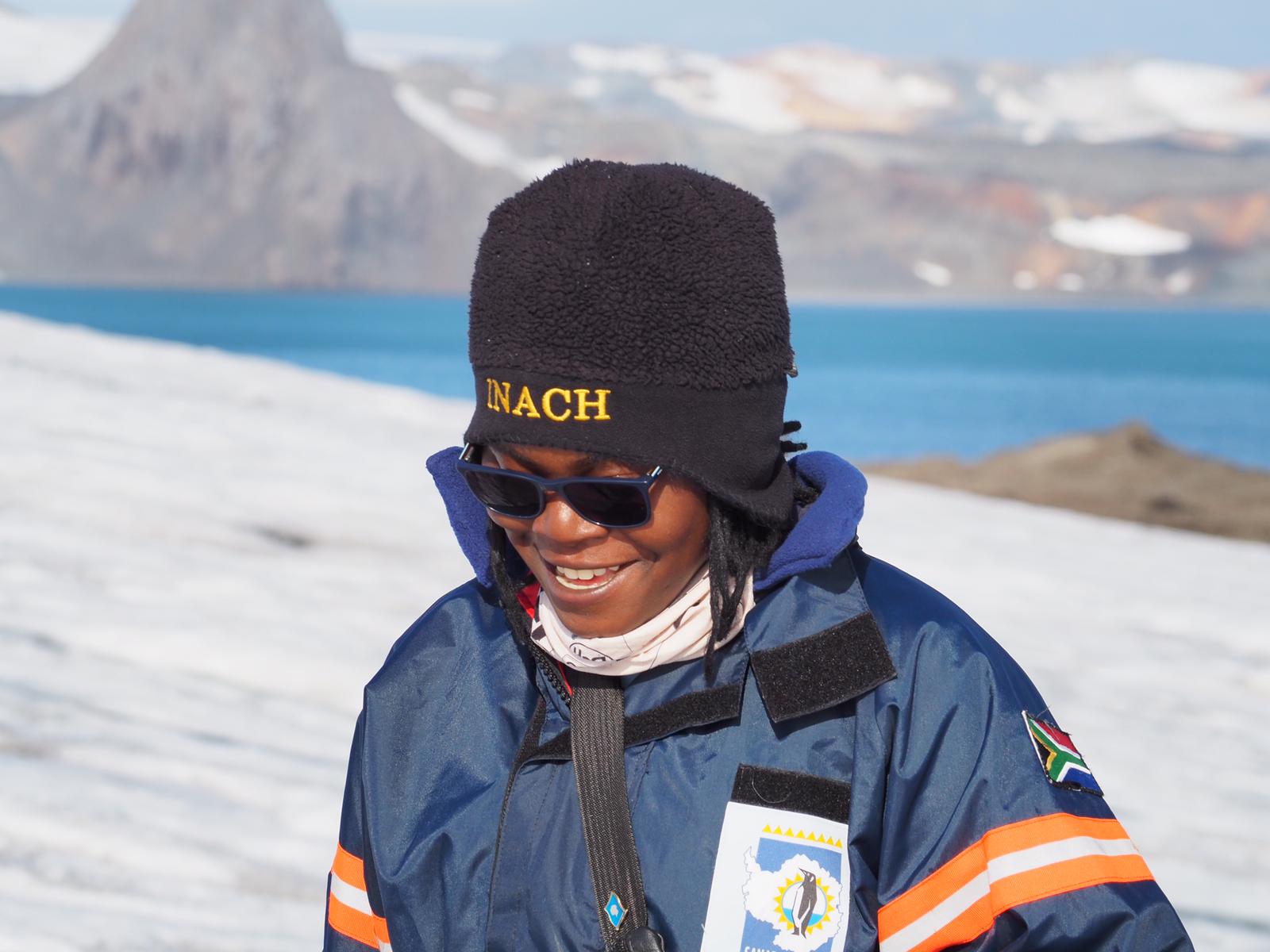 ambition that will not be held back and we are convinced that she will become an Antarctic ambassador at heart and further the connection between Cape Town and the Antarctic, as part of the network of gateway cities toward the Antarctic. Her expectation for the expedition before she left : “I look forward especially to interacting with the other young leaders and researchers chosen for this expedition to possibly establish connections. As an aspiring Oceanographer, Antarctica is an important milestone in my career, it represents the pinnacle of science, cooperation and diplomacy. To be the South African ambassador for this project is a privilege and is extremely humbling.” Rudzi arrived back in Cape Town on 28 February 2020 from the first ACYE
ambition that will not be held back and we are convinced that she will become an Antarctic ambassador at heart and further the connection between Cape Town and the Antarctic, as part of the network of gateway cities toward the Antarctic. Her expectation for the expedition before she left : “I look forward especially to interacting with the other young leaders and researchers chosen for this expedition to possibly establish connections. As an aspiring Oceanographer, Antarctica is an important milestone in my career, it represents the pinnacle of science, cooperation and diplomacy. To be the South African ambassador for this project is a privilege and is extremely humbling.” Rudzi arrived back in Cape Town on 28 February 2020 from the first ACYE
These early career women scientists have done presentations all over the world at international and national events where they represented South Africa and their institutions and have been authors and co-authors of articles in scientific magazines They are an inspiration to the girls of South Africa in Science.

by Ria Olivier | Feb 5, 2020 | Announcement, Current Event, Fellowship, SA Agulhas II, SEAmester, Southern Ocean, Uncategorised

CLOSING DATE extended to 13 MARCH 2020
DOWNLOAD APPLICATION FORMS
SEAmester – South Africa’s Class Afloat aims to introduce marine science as an applied and cross-disciplinary field to students who have shown an affinity for core science disciplines. It will combine traditional class-room lectures with hands-on ship-based deck activities for a maximum of 46 students; while providing them with an opportunity to support specialist scientists in recognised marine research activities. Our research group comprises of over 30 oceanographic, fisheries, biogeochemical and biological experts, who jointly have trained over 600 Southern African students on-board a wide variety of international and local research vessels. read more at SEAmester website
How do I qualify?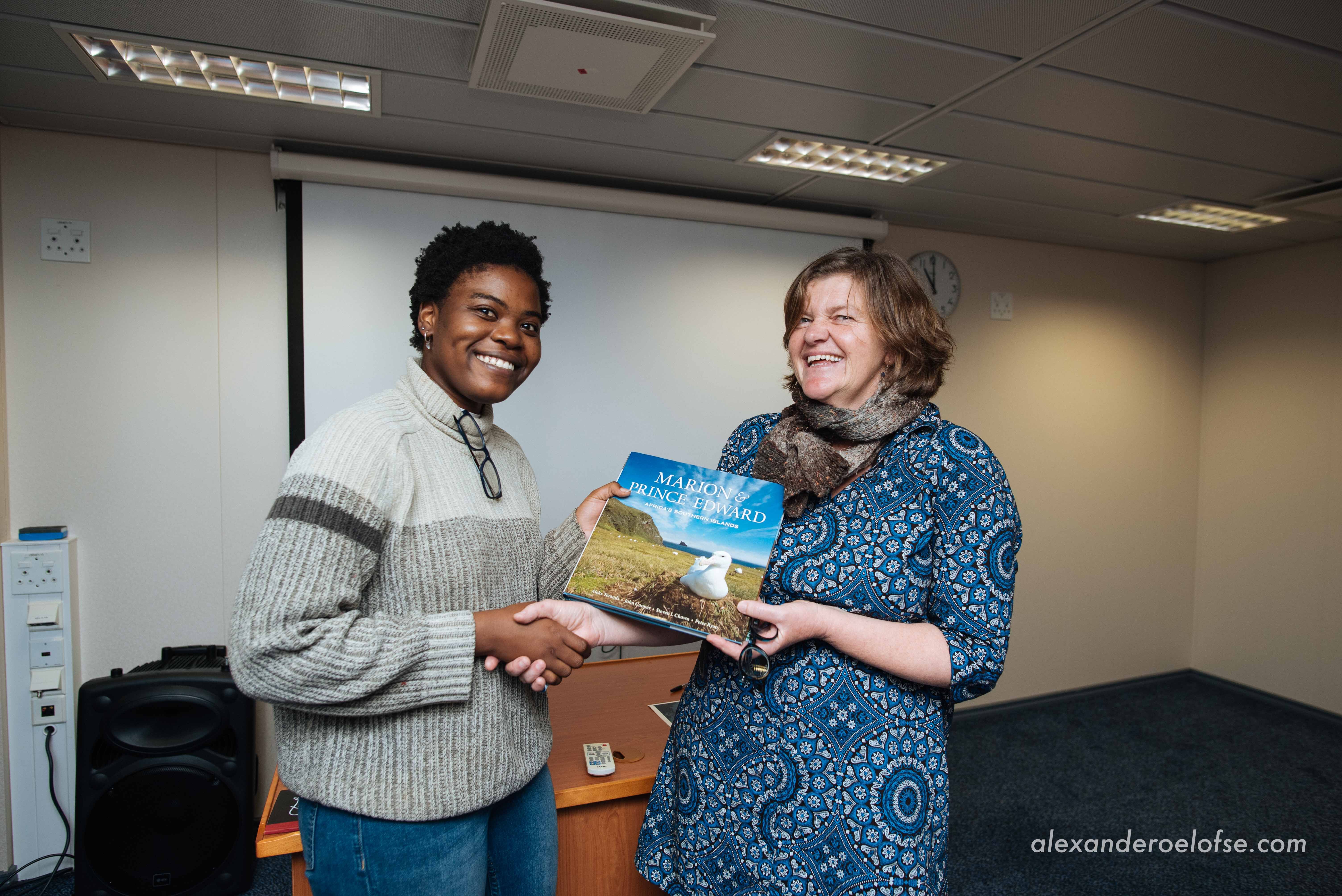
A maximum of 46 post-graduate (Honours/BTech, MSc/MTech, PhD and Interns) University and Technikon students will be selected nationwide. Applications will be accepted from currently registered post-graduate students with a background in marine or similar sciences. Past sea-going experience is not compulsory. Left: Rudzanie Silima best Student SEAmester 2019 with Prof Isabelle Ansorge of UCT
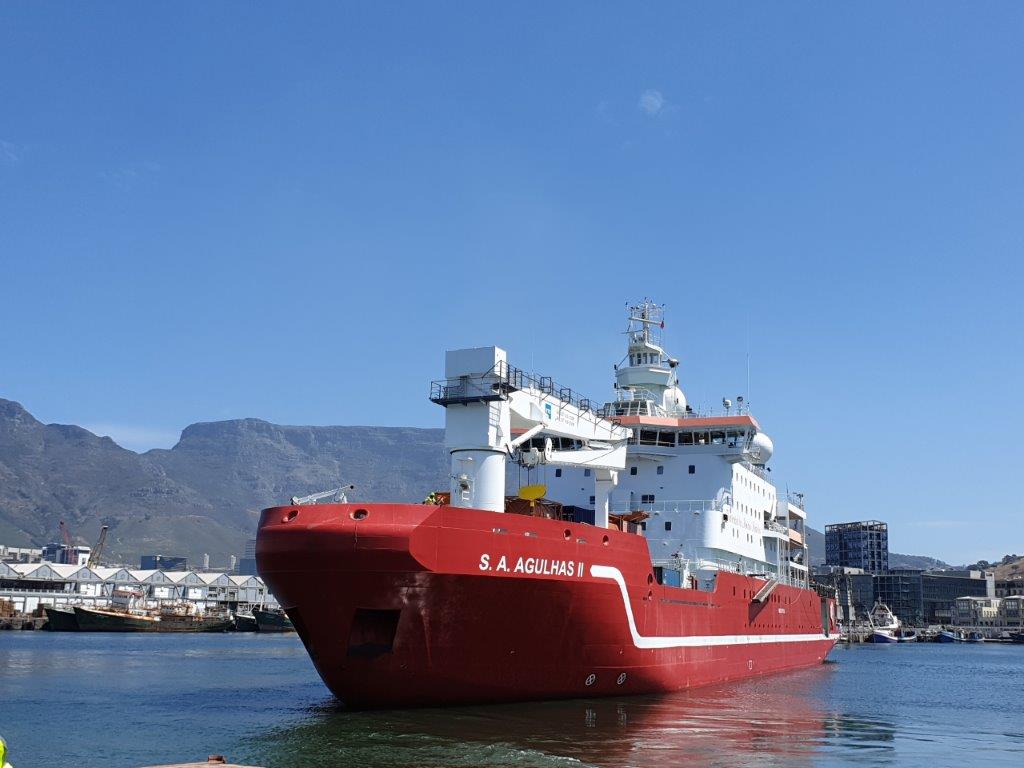 What ship will SEAmester take place on?
What ship will SEAmester take place on?
The new South African polar research vessel SA Agulhas II will be used for SEAmester V. The SA Agulhas II is a state-of-the-art icebreaker and is fully equipped for all marine research activities. To find out more go to http://www.sanap.ac.za/
What will it cost me?
Nothing. SEAmester is fully funded through the Departments of Science and Technology (DST) and Environmental Affairs (DEA). All board and lodging onboard the SA Agulhas II will be provided free of charge through SEAmester.
What research will SEAmester be involved in??
SEAmester will run in parallel to the scientific objectives of the Agulhas System Climate Array (ASCA) spearheaded by DSTs SAEON Egagasini node. ASCA is a multi-institutional, international collaboration and designed to provide the first long-term observations of Agulhas Current volume, heat and salt transport and its variability from seasonal to interannual timescales. ASCA’s objectives are to determine how the Agulhas Current and its role in the global conveyor belt varies over time. To find out more go to http://asca.dirisa.org
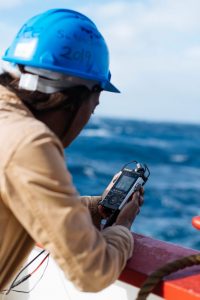
Listening for mammal sounds.
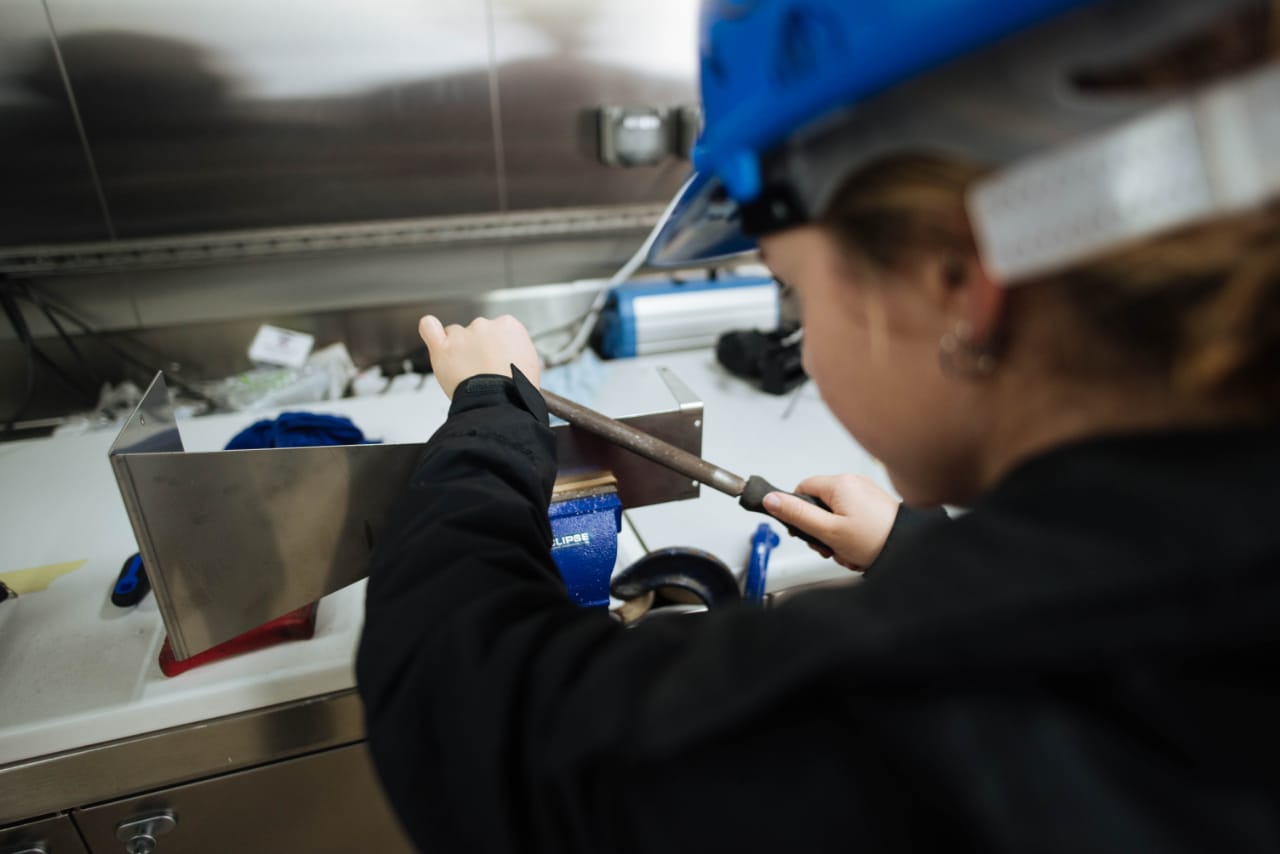
Working on their Aghulus bottle opener in the practical session.
What will be expected from me?
You will be expected to choose one of two module steams – either Tools of the Trade or Oceans in a Changing World (see overleaf). Learning will comprise of daily class-room lectures, daily assignments and deck work – running in parallel to the ASCA programme. Students from both streams will also provide research support to specialist scientists and obtain daily hands-on deck training, data collection, sampling and data analysis. Each student will gain experience working with the full suite of oceanographic, atmospheric and biological ship-based instrumentation such as CTD, underway measurements and autonomous devices such as Argo, SVP drifters as well as gain experience on all biological net tows. Training on data analysis following each deployment will be given, as well as technical and electronic experience in calibrating, assembling and modifying each instrument. In addition, each student will work on a specific scientific mini-project related to their area of interest and the scientific research underway.
What are the tentative dates for SEAmester?
SEAmester will depart on the 13th July returning to Cape Town on the 24th July 2020. Travel arrangements and costs will be made through the SEAmester programme for all students residing outside of the Western Cape. PLEASE NOTE: Applicants to be aware that the cruise dates may be subject to change by a few days.
What travel documentation must I have?
SEAmester will be working outside of South African waters and therefore all participants are requested to have a valid passport. SAMSA approved medicals will be required and costs incurred will be covered by the SEAmester programme. Students with study visas need to ensure that their visas have not expired.
Is there reading material – See the attached files (SANCOR site) for any additional reading material, or contact Isabelle.Ansorge@uct.ac.za
See SEAmester 2019 videos on SEAmester website as well as the previous years
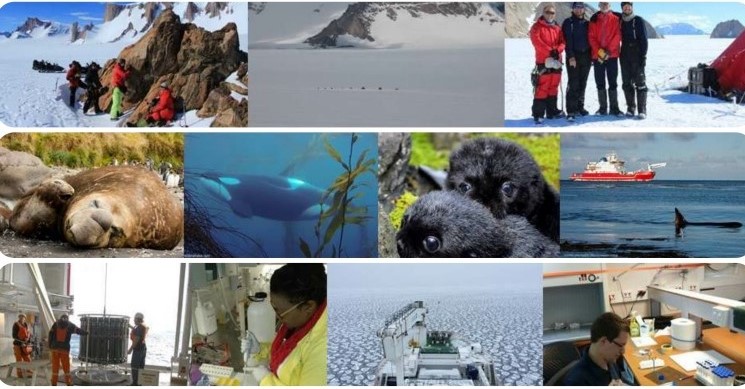
by Ria Olivier | Jan 7, 2020 | Antarctica, Fellowship, Marion Island, Research, SCAR, Science
 2020 funding and research opportunities for scientists and researchers. See all the inks below and make 2020 count.
2020 funding and research opportunities for scientists and researchers. See all the inks below and make 2020 count.
University of Johannesburg, South Africa: Postdoctoral fellowship in marine and/or sub-Antarctic island genomics.
The Centre for Ecological Genomics and Wildlife Conservation at the University of Johannesburg
(https://molzoolab.co.za/) invites applications for a Global Excellenece and Stature (GES 4.0)
postdoctoral research fellowship. Full details
SCAR 2020 Symposium
SERCE will be offering grants to support travel and registration costs associated with attending SCAR2020. These will be up to $2,000 USD, and will be awarded to early-career researchers (ECRs) or researchers from countries with emerging Antarctic programs. An ECR is defined broadly as those researchers who have accumulated up to 7 years of research since completing their PhD (taking into account periods of part-time research or career breaks). link: https://www.scar.org/scar-news/serce-news/serce-funding-scar2020/
Swedish Institute Scholarships for South Africa (SISSA)
Are you a talented and ambitious citizen of South Africa and want to study for a master’s degree in Sweden on a fully-funded scholarship? Find out if you can apply to the Swedish Institute Scholarships for South Africa. Read more at
Swedish Institute
If you have any information of research opportunities, mail us at antarcticlegacy@sun.ac.za
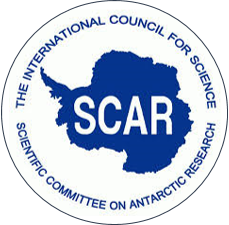
by Fishgate@sanap | May 10, 2019 | Announcement, Fellowship, News, Research, Science
The information below was sent through by the Scientific Committee on Antarctic Research.
SCAR Fellowship Scheme, partnerships and new opportunities in 2019
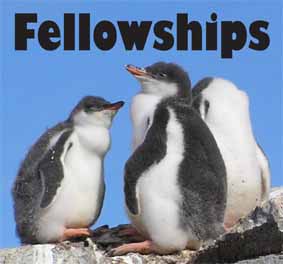
The Scientific Committee on Antarctic Research (SCAR), the Council of Managers of National Antarctic Programs (COMNAP), and the Commission for the Conservation of Antarctic Marine Living Resources (CCAMLR) have been working together for many years to support talented early-career researchers, scientists, engineers, environmental managers, and other professionals to strengthen international capacity and cooperation in fields such as science support and facilitation, environmental management implementation, and climate, biodiversity, conservation, humanities and astrophysics research by way of an annual funding opportunity.
For 2019, these Antarctic organisations are joined by the International Association of Antarctica Tour Operators (IAATO) and the World Meteorological Organization (WMO), who will each support additional Antarctic-related fellowships.
SCAR Launches Antarctic Fellowship Opportunities for 2019
SCAR today launches its 2019 Antarctic-related Fellowships for early-career researchers. SCAR will offer 5 to 6 fellowships of up to USD $15,000 each for 2019, with additional support for the scheme having been provided by India, Korea and France. A new SCAR/WMO Fellowship is also available in 2019 as detailed below. The Fellowships enable early-career researchers to join a project team from another country, opening up new opportunities and often creating partnerships that last for many years and over many Antarctic field seasons. The deadline for fellowship applications is 17 July 2019.
Additional opportunities in 2019 through the SCAR Fellowship scheme
For 2019 there are a number of extra opportunities through the SCAR scheme, with some restrictions on applicability but using the standard application process for SCAR Fellowships:
- India is providing support to fund one full SCAR Fellowship, with France providing a contribution to the Fellowship funds.
- The Republic of Korea will also contribute to one Fellowship to be allocated to an applicant from a country which has been under-represented within the SCAR Fellowship scheme to date.
- For the new SCAR/WMO Fellowship, the WMO and SCAR will jointly fund one Fellowship for applicants from a WMO country who meet the Fellowship eligibility criteria of the WMO.
COMNAP and IAATO have already launched their Fellowship scheme for 2019 and CCAMLR launch their Scholarship scheme with two deadlines in 2019. Details are available at : https://www.scar.org/community-news/fellowship-opportunities-launched/
Background information:
The SCAR scheme is launched today, noting the complementary schemes of our partners – the COMNAP and IAATO Fellowship Scheme and the CCAMLR Scientific Scholarship Scheme. Full details of these schemes are available on their respective websites below.
For more information on SCAR Fellowships, visit the SCAR website at:
www.scar.org/awards/fellowships/information/
For information on the COMNAP and IAATO Fellowships, visit the COMNAP website at:
www.comnap.aq/SitePages/fellowships.aspx
For information on CCAMLR Scholarships, visit the CCAMLR website at:
www.ccamlr.org/en/science/ccamlr-scientific-scholarship-scheme


 CAREER OPPORTUNITY – Post Doctoral Fellowships. The Council for Scientific and Industrial Research (CSIR) is a leading scientific and technology research organisation that researches, develops, localises and diffuses technologies to accelerate socio-economic prosperity in South Africa. The organisation’s work contributes to industrial development and supports a capable state.
CAREER OPPORTUNITY – Post Doctoral Fellowships. The Council for Scientific and Industrial Research (CSIR) is a leading scientific and technology research organisation that researches, develops, localises and diffuses technologies to accelerate socio-economic prosperity in South Africa. The organisation’s work contributes to industrial development and supports a capable state.

 The CSIR has three opportunities for Post-Doctoral Fellowships in the Southern Ocean Carbon and Climate Observatory programme (SOCCO), within the Smart Places cluster, and hosted at the Marine Institute (Ma-Re), UCT. The purpose of the fellowships is to conduct research in line with three H2020 projects in which SOCCO is a partner. The positions are offered as a two-year contract with the possibility of extension for a third year. These opportunities are based in Rosebank, Cape Town. For more information about the programme and cluster please visit http://www.socco.org.za and http://www.csir.co.za/smart-places respectively.
The CSIR has three opportunities for Post-Doctoral Fellowships in the Southern Ocean Carbon and Climate Observatory programme (SOCCO), within the Smart Places cluster, and hosted at the Marine Institute (Ma-Re), UCT. The purpose of the fellowships is to conduct research in line with three H2020 projects in which SOCCO is a partner. The positions are offered as a two-year contract with the possibility of extension for a third year. These opportunities are based in Rosebank, Cape Town. For more information about the programme and cluster please visit http://www.socco.org.za and http://www.csir.co.za/smart-places respectively.


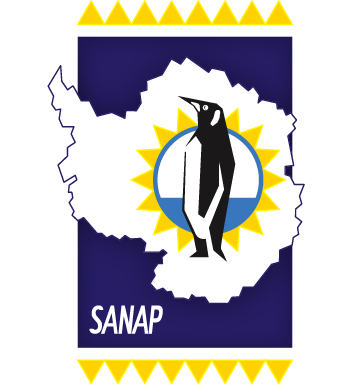

 INVITATION FOR INNOVATIVE RESEARCH PROPOSALS
INVITATION FOR INNOVATIVE RESEARCH PROPOSALS  (40-ISEA)
(40-ISEA) -NCPOR operate two-year round stations in Antarctica, which are~ 3000 km apart
-NCPOR operate two-year round stations in Antarctica, which are~ 3000 km apart

 from Goa to Antarctica and back is taken care of by ESSO-NCPOR. Travel only available in Summer Season
from Goa to Antarctica and back is taken care of by ESSO-NCPOR. Travel only available in Summer Season
 of Marion Island in the sub-Antarctic. Her research is on the impact of various physical factors on landscape change, for example: animals (seals in particular) on soil properties and vegetation community composition; ice, above or below the ground surface. Geomorphology or better known as Physical Geography is her area(s) of Interest and more specifically, the processes behind
of Marion Island in the sub-Antarctic. Her research is on the impact of various physical factors on landscape change, for example: animals (seals in particular) on soil properties and vegetation community composition; ice, above or below the ground surface. Geomorphology or better known as Physical Geography is her area(s) of Interest and more specifically, the processes behind  Periglacial Landforms and to a lesser extent Biogeomorphology. She is fascinated by cold and mountainous places, and thus prefer to work in environments like the High Drakensberg, Subantarctic Marion Island or Antarctica. Liezel is a
Periglacial Landforms and to a lesser extent Biogeomorphology. She is fascinated by cold and mountainous places, and thus prefer to work in environments like the High Drakensberg, Subantarctic Marion Island or Antarctica. Liezel is a  research is part of a growing body of work that critically examines biogeochemical cycling in the ocean, particularly regions that are currently under-sampled. The research aims involve exploring phytoplankton community dynamics and microbe-nutrient interactions in the Indian Ocean, including subtropical and Southern
research is part of a growing body of work that critically examines biogeochemical cycling in the ocean, particularly regions that are currently under-sampled. The research aims involve exploring phytoplankton community dynamics and microbe-nutrient interactions in the Indian Ocean, including subtropical and Southern  Ocean waters. To-date, Kolisa has been awarded the Advancing Womxn Fellowship in the Department of Oceanography. She is a Black Women in South Africa Fellows of 2019. In 2019 she was nominated as one of the Inspiring Fifty Women in STEM South Africa. Kolisa has a passion for learning science and for sharing her science and this PhD programme has allowed her to engage in effective science communication through both public speaking and scientific writing. Kolisa’s work has also been documented in the academic communication magazine, The Conversation Africa. Earlier this year she was invited to be on the “New Voices” panel at the annual Nature, Environment and Wildlife Filmmakers Congress. Sinyanya is committed to increasing the visibility of women in STEM and to that end, she runs a blog called
Ocean waters. To-date, Kolisa has been awarded the Advancing Womxn Fellowship in the Department of Oceanography. She is a Black Women in South Africa Fellows of 2019. In 2019 she was nominated as one of the Inspiring Fifty Women in STEM South Africa. Kolisa has a passion for learning science and for sharing her science and this PhD programme has allowed her to engage in effective science communication through both public speaking and scientific writing. Kolisa’s work has also been documented in the academic communication magazine, The Conversation Africa. Earlier this year she was invited to be on the “New Voices” panel at the annual Nature, Environment and Wildlife Filmmakers Congress. Sinyanya is committed to increasing the visibility of women in STEM and to that end, she runs a blog called  She has just been awarded the HJ Scoonbee medal for the best MSc Dissertation
She has just been awarded the HJ Scoonbee medal for the best MSc Dissertation  pressures on the organism and the genes that experience selection in response to environmental change. Her results highlighted complex spatial genetic patterns that could be driven by micro-habitat preferences and/or a fitness funnel driven by local adaptations. This complexity illustrates that individuals respond to environmental changes. Her results may bring about far-reaching implications for conservation management on Marion Island, highlighting the importance of considering fine-scale evolutionary processes in management plans. In essence, her results emphasize that conservation efforts are best addressed in a ‘bottom-up’ approach as opposed to a ‘top-down’ approach, which is the case for (Southern Ocean) biodiversity. She is passionate about her work and is extremely fond of the world down south. Daniela loves everything about nature, the outdoors, and sports, particularly soccer, of which she is part of a ladies team in a provincial league. She enjoys spending time with her friends and family, and in her free time, she enjoys the hobby of fishkeeping.
pressures on the organism and the genes that experience selection in response to environmental change. Her results highlighted complex spatial genetic patterns that could be driven by micro-habitat preferences and/or a fitness funnel driven by local adaptations. This complexity illustrates that individuals respond to environmental changes. Her results may bring about far-reaching implications for conservation management on Marion Island, highlighting the importance of considering fine-scale evolutionary processes in management plans. In essence, her results emphasize that conservation efforts are best addressed in a ‘bottom-up’ approach as opposed to a ‘top-down’ approach, which is the case for (Southern Ocean) biodiversity. She is passionate about her work and is extremely fond of the world down south. Daniela loves everything about nature, the outdoors, and sports, particularly soccer, of which she is part of a ladies team in a provincial league. She enjoys spending time with her friends and family, and in her free time, she enjoys the hobby of fishkeeping. She is currently a Capetonian and studies towards a Masters in Physical/Chemical Oceanography, through the Nelson Mandela University. She was one of 41 students that qualified for this year’s SEAmester cruise and won the prize for best student on-board. During the
She is currently a Capetonian and studies towards a Masters in Physical/Chemical Oceanography, through the Nelson Mandela University. She was one of 41 students that qualified for this year’s SEAmester cruise and won the prize for best student on-board. During the  ambition that will not be held back and we are convinced that she will become an Antarctic ambassador at heart and further the connection between Cape Town and the Antarctic, as part of the network of gateway cities toward the Antarctic. Her expectation for the expedition before she left : “I look forward especially to interacting with the other young leaders and researchers chosen for this expedition to possibly establish connections. As an aspiring Oceanographer, Antarctica is an important milestone in my career, it represents the pinnacle of science, cooperation and diplomacy. To be the South African ambassador for this project is a privilege and is extremely humbling.” Rudzi arrived back in Cape Town on 28 February 2020 from the first ACYE
ambition that will not be held back and we are convinced that she will become an Antarctic ambassador at heart and further the connection between Cape Town and the Antarctic, as part of the network of gateway cities toward the Antarctic. Her expectation for the expedition before she left : “I look forward especially to interacting with the other young leaders and researchers chosen for this expedition to possibly establish connections. As an aspiring Oceanographer, Antarctica is an important milestone in my career, it represents the pinnacle of science, cooperation and diplomacy. To be the South African ambassador for this project is a privilege and is extremely humbling.” Rudzi arrived back in Cape Town on 28 February 2020 from the first ACYE

 What ship will SEAmester take place on?
What ship will SEAmester take place on? 





